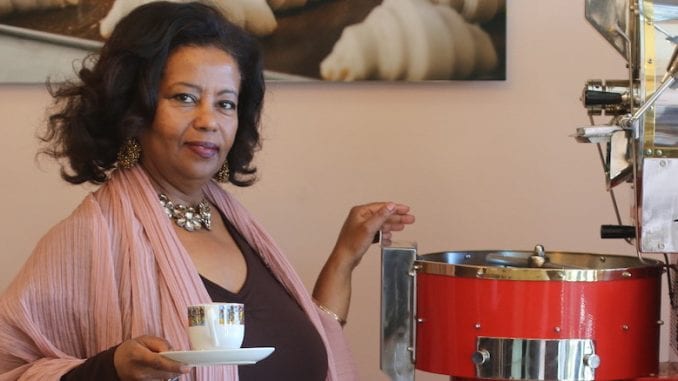
We talk to the co-owner of North Carolina’s NABS Deli and Coffee Shop about growing up in Ethiopia, developing a passion for roasting, and how the beverage connects people.
BY CHRIS RYAN
BARISTA MAGAZINE ONLINE
Photos courtesy of NABS Deli and Coffee Shop
Growing up in Ethiopia, Yalem Kiros saw the Ethiopian coffee ceremony as a way of life. Whether with friends, family, or other guests, they would enjoy the tradition that started with washing green coffee beans, then continued by placing the beans in a small pan with a long handle and shuffling them over the flame, roasting them to the ideal level to be enjoyed by the group.
This ceremony imbued Yalem with a love of roasting that has continued to this day: A former nurse, Yalem and her husband, Ed Wiley III, opened NABS Deli and Coffee Shop in Rocky Mount, N.C., earlier this year. She is the lead roaster of the shop, which exclusively serves single-origin Ethiopian coffees. And while her roasting method may have evolved past the open flame, her passion for the bean is as strong as ever. We talked to Yalem about the Ethiopian coffee ceremony, what coffee means to her, and much more.
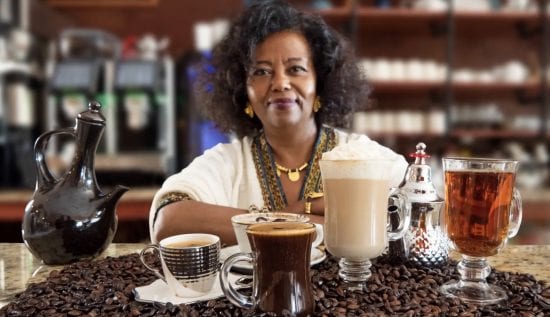
Chris Ryan: Can you describe your experiences with coffee as a child in Ethiopia? What attracted you to the coffee ceremonies, and when and how did you get involved with coffee roasting?
Yalem Kiros: Just as we have for many centuries, we Ethiopians perform coffee ceremonies as a part of daily life. This is the land that introduced coffee to the world some 1,200 years ago when a goat herder discovered the berry in the highlands of the Kaffa province. We take our coffee seriously!
In Ethiopia, coffee is highly democratized. Everyone, regardless of their wealth or social status, lights a small charcoal stove to roast coffee. Anyone who lives alone or can’t afford coffee has an open invitation to a neighbor’s home. When we share coffee, we also share dreams from the night before and bless the day ahead. It allows us to bond with one another while honoring family, friends and visitors.
Having grown up in a home where coffee was brewed three times a day, my four sisters and I learned how to perform the coffee ceremony by the time we were 8 years old. We saw it as an honor. In fact, whenever we had a guest, we’d have yet another ceremony. When others praised us for how well we held the ceremony, we beamed with pride.
I bring this same pride to the coffee I roast at my shop now. Coffee is very personal, and I take this into account as I roast it. Essentially, my goal is to get my customers to experience the fullness of the flavor of fresh-roasted coffee, no matter what level of roasting. Coffee shops can camouflage the flavor of coffee with syrups, because oftentimes the bean or the roasting method produces a bitter brew. There are times that I even leave in the husk, which gives the coffee an almost floral flavor, but even then it is not bitter.
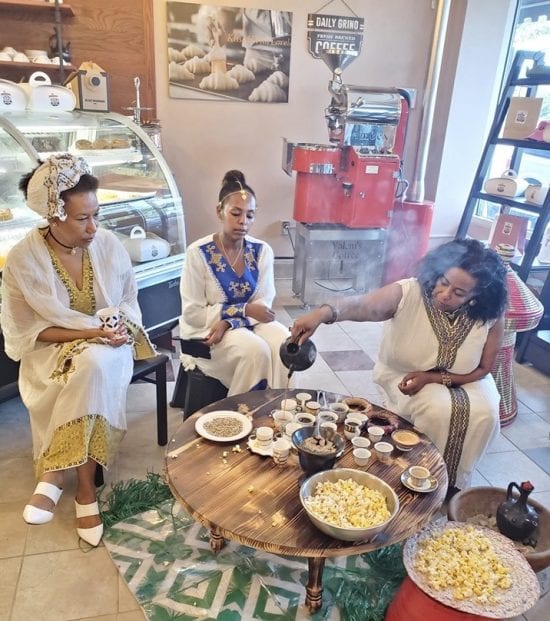
How did you come to open NABS Deli and Coffee Shop in North Carolina? Why did you want to bring the Ethiopian coffee experience to North Carolina to share with people there?
NABS Deli and Coffee Shop is something of a sibling operation to our other restaurant, The Prime Smokehouse: Barbecue & Beyond. We opened The Prime Smokehouse about six years ago, and earned an award-winning reputation for Texas-style, slow-cooked barbecue, which is very different from the vinegar-based North Carolina-style pulled pork. It also takes a long time to prepare, so we wanted to offer a quick, grab-and-go alternative that also gave me a platform to spread my wings with something I’ve always loved: roasting and brewing coffee. I also wanted to introduce my guests to what hospitality looks like to an Ethiopian who is used to performing a coffee ceremony.
NABS is sort of two restaurants in one—a sandwich shop inspired by my husband Ed’s Philadelphia background (he worked in his family’s catering business), and a coffee shop that is not just informed by my upbringing in Ethiopia but makes coffee the centerpiece. To this day, I still roast coffee beans over flames on a stovetop at home. People always think that I’m making such a fuss when I do this, but that is who I am, and I enjoy it. Ed, who was used to grabbing a cup of coffee at a chain before he met me, has been saying for years that we have to give others a chance to experience what he gets on a daily basis. So, NABS has helped us realize that dream. In fact, it’s a metaphor for our marriage: the union of two disparate concepts and cultures.
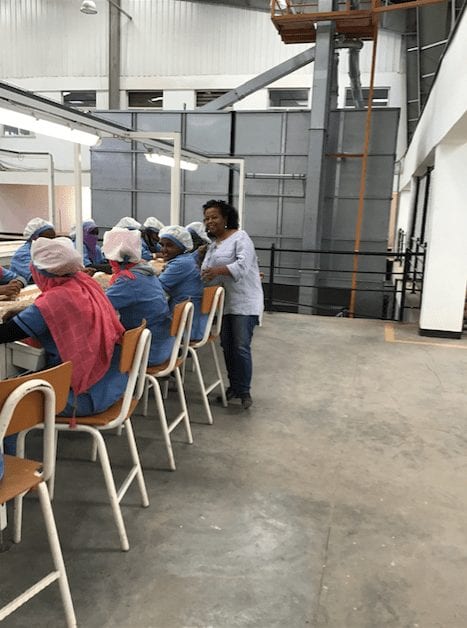
Can you share more about your roasting philosophy for the business?
You won’t see me messing with an open flame at NABS. There are some great roasters out there that allow you to tailor how you want to roast the beans. For example, we use an Ambex YM-15. We can digitally program the roaster to replicate precisely how I roast my beans by hand—from periodically reducing the heat to jumbling the beans so that it ends up with a roast that you would swear was done the old-fashioned way. Honestly, it’s even better, because now, instead of a couple of cups worth of beans, I can roast up to five pounds at a time.
We use only single-origin beans from Ethiopia; my aim is to serve up a hot cup of Ethiopia. Whenever my new coffee arrives, I first take it home and roast it by hand to test it out. For me, it’s all very intuitive. I was trained to do it. But when I come into NABS, even though I used a computerized version of my roasting methods, I still listen and watch and smell throughout the process to ensure that it’s ready—all as if I were still roasting the beans over a flame.
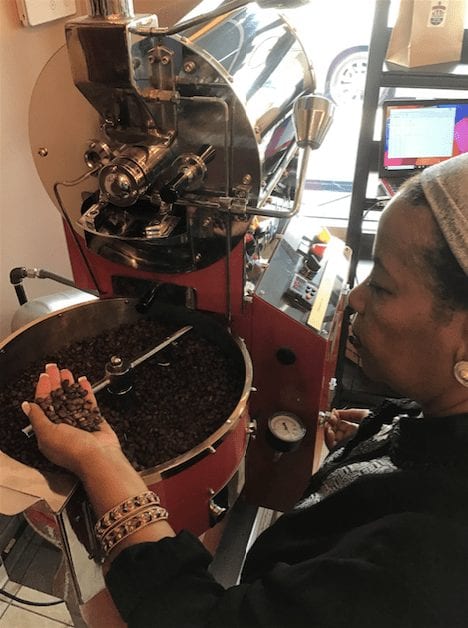
Finally, what is important and special to you about coffee, and why did you decide to pursue it as a career?
In Ethiopia, they say, “Coffee is our bread.” It’s not just a drink. It’s part societal lifeblood, part drinkable talisman, part cultural glue. Coffee is life. Even in the decades where I worked as a nurse at places like Duke University and Johns Hopkins, coffee was always in my life and in the back of my mind. I have always thought about doing this. Like my husband, who was a successful reporter who most recently worked for BET, we both decided to change career paths and collectively follow our passions. The restaurants are the living, breathing embodiments of these passions, and for me, NABS is the perfect means for me to share the Ethiopian coffee traditions with others.

